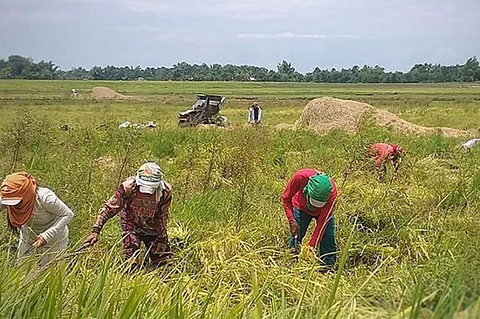

THE Technical Education and Skills Development Authority (Tesda) 7 has started rolling out its training programs for farmers to boost their competitiveness amid the liberalization of rice trade.
Wilkie Reroma, supervising specialist at Tesda 7, said the goal is to have farmers diversify and learn new skills under a program called the Rice Extension Services Program (RESP).
Farmers blamed the Rice Liberalization Act for their falling incomes, as the law allowed cheaper rice imports to flood the market.
The law also creates the the Rice Competitiveness Enhancement Fund (RCEF), which entails the government to allot an annual P10 billion budget for the next six years to several concerned agencies, including Tesda, to help improve the rice farmers’ productivity and income amid the rice trade liberalization.
In an interview at a government forum in Cebu City Tuesday, Oct. 22, 2019, Reroma noted that the RESP covers the four provinces in Central Visayas—Cebu, Bohol, Negros Oriental and Siquijor.
“In terms of percentage, we’re now at 15 percent sa atong coverage in training farmers in the region,” he said.
Last Sept. 16, Tesda Secretary Isidro Lapeña signed a circular detailing the implementing guidelines on RESP activities to be carried out by the agency’s regional and provincial offices in 1,010 priority municipalities.
Adequate aid
The RCEF seeks to address four areas—rice farm machinery and equipment; rice seed development, propagation, and promotion; expanded rice credit assistance; and rice extension services.
Reroma said the program would ensure rice growers are given adequate aid, considering the challenge of free trade where quantitative restrictions on rice imports are removed and replaced by a purely tariff system.
Under the rice extension services component, the Tesda, Philippine Center for Postharvest Development and Mechanization, Philippine Rice Research Institute and the Agricultural Training Institute are to utilize 10 percent of the total fund for skills training, developing new education modules and other related extension efforts.
Under RESP, Tesda is tasked to teach skills on rice crop production, modern rice farming techniques, seed production, farm mechanization and technology transfer through farm schools nationwide.
The program aims to raise the skills of the farmers in producing more rice at a reduced cost, increase their access to modern and science-based farming techniques and extend the availability of free skills training programs to them.
Call to register
Tesda urged more farm schools to register their programs with the agency so more training centers can offer rice production and agricultural technology skills-related training. (CSL)